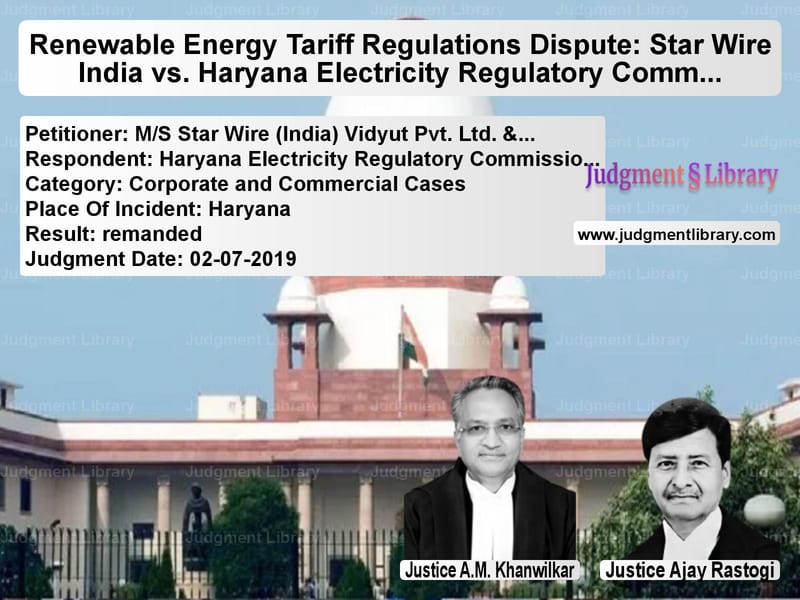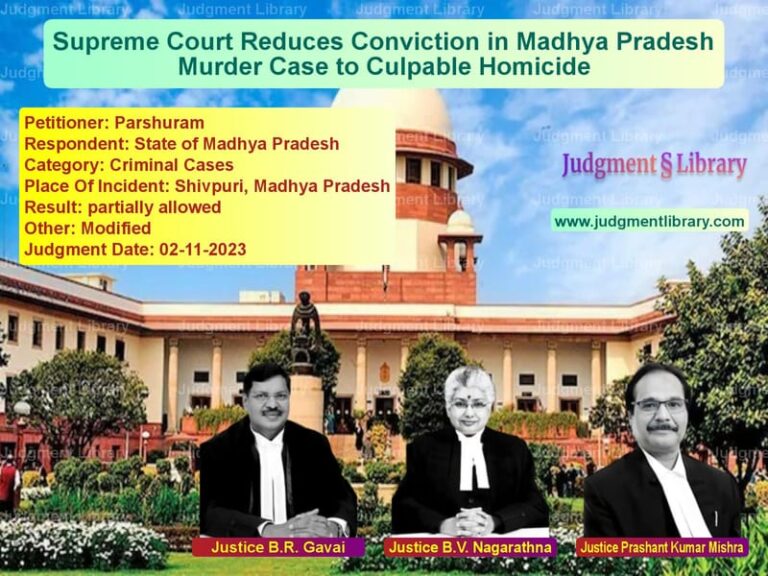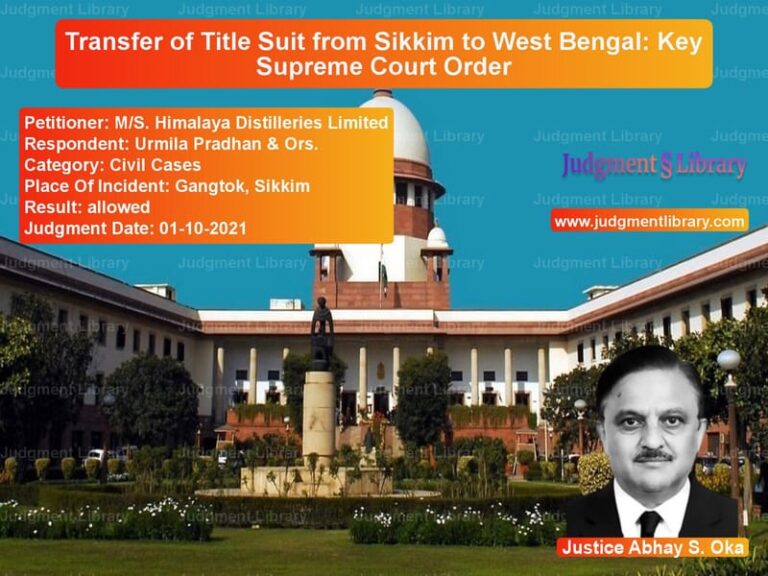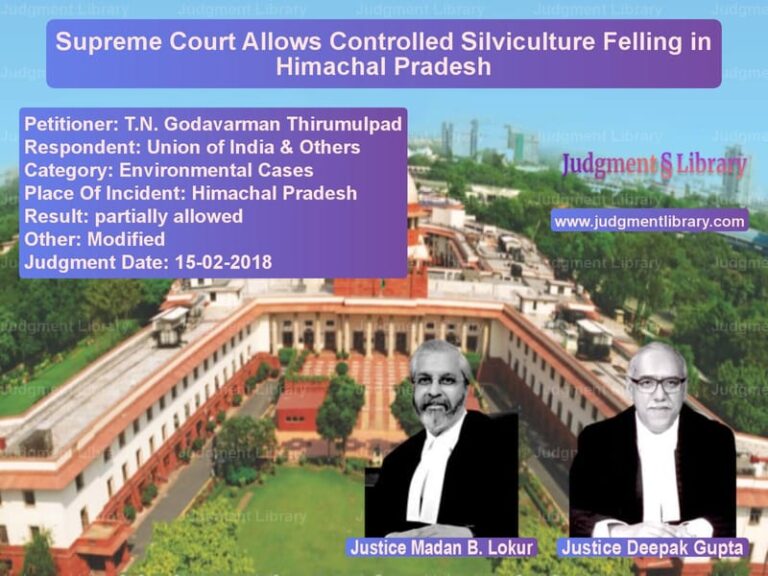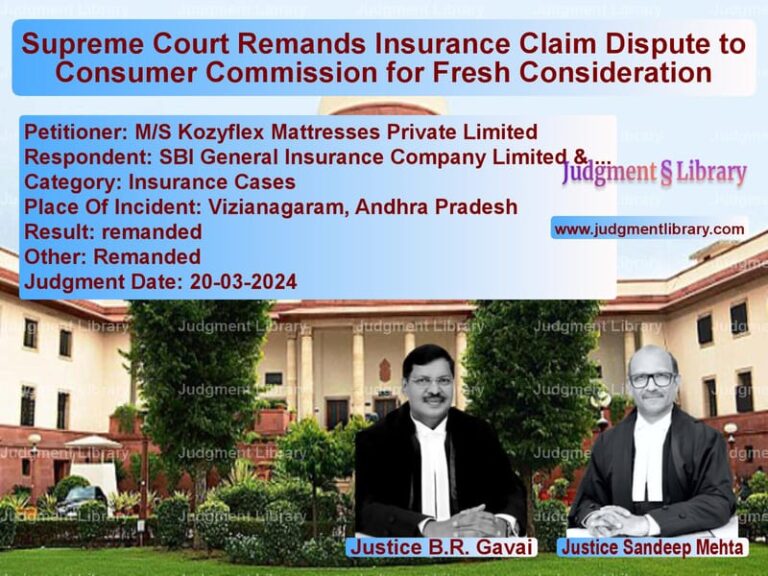Renewable Energy Tariff Regulations Dispute: Star Wire India vs. Haryana Electricity Regulatory Commission
The case of Star Wire (India) Vidyut Pvt. Ltd. & Anr. vs. Haryana Electricity Regulatory Commission revolved around the challenge to amendments made to the Haryana Electricity Regulatory Commission (HERC) regulations regarding tariff determination for renewable energy projects. The Supreme Court had to examine whether the amendments, which created different tariff structures within the same control period, were valid and non-discriminatory.
Star Wire (India) Vidyut Pvt. Ltd. set up a 9.90 MW independent Biomass Power Plant, which became commercially operational on May 3, 2013. The dispute arose when HERC amended the tariff regulations through a notification on August 12, 2015, altering tariff norms for projects commissioned in different financial years during the same control period (2013-2017). The appellant contended that this amendment unfairly discriminated against projects commissioned in the financial year 2013-14.
Arguments of the Petitioner
The appellants, represented by their legal counsel, challenged the amended regulations, arguing:
“The amended regulations create an arbitrary classification by treating projects commissioned in 2013-14 differently from those commissioned in later years within the same control period, without any intelligible differentia.”
The petitioners further contended:
- The amendments resulted in retrospective denial of expected tariff benefits, violating the principles of equality and fair play.
- The control period from 2013-2017 should have uniform tariff norms, and different treatment for projects based on their commissioning year was discriminatory.
- The amendment lacked any rational basis and contravened Regulation 4 of the principal regulations, which stipulated that tariff norms from the prior period should continue until revised regulations were issued.
Arguments of the Respondent
Haryana Electricity Regulatory Commission, the respondent in the case, defended its decision, stating:
“The amendments were introduced after a comprehensive review and public consultation process, considering market conditions and technological developments.”
The respondent further argued:
- The amendments were necessary to rationalize tariffs and ensure fairness across different projects.
- The Commission had the authority under the Electricity Act, 2003, to revise tariff norms based on prevailing economic conditions.
- The appellants had participated in public hearings and failed to show any concrete prejudice caused by the amendments.
Supreme Court’s Verdict
The Supreme Court, with Justices A.M. Khanwilkar and Ajay Rastogi presiding, found the High Court’s ruling inadequate in addressing the core issues and remanded the case for fresh consideration. The Court observed:
“The High Court has committed a manifest error in failing to exercise its jurisdiction properly. The judgment lacks any meaningful discussion of the issues raised, and the findings are cryptic and unsatisfactory.”
The Court ruled:
- The classification of projects within the same control period was not adequately justified.
- The High Court failed to properly analyze the legal validity of the amended regulations.
- The matter required detailed examination regarding the principle of non-discrimination in tariff determination.
Key Takeaways from the Judgment
- Regulatory amendments must have a rational basis and should not arbitrarily create classifications among similarly placed entities.
- Judicial review of regulatory decisions should be thorough and not dismiss key contentions without reasoned analysis.
- Electricity regulatory bodies must ensure consistency and fairness in tariff determinations within the same control period.
- Cases involving regulatory discrimination require proper judicial scrutiny before arriving at conclusions.
The Supreme Court’s decision underscores the importance of transparency and fairness in tariff regulation for renewable energy projects.
Petitioner Name: M/S Star Wire (India) Vidyut Pvt. Ltd. & Anr..Respondent Name: Haryana Electricity Regulatory Commission.Judgment By: Justice A.M. Khanwilkar, Justice Ajay Rastogi.Place Of Incident: Haryana.Judgment Date: 02-07-2019.
Don’t miss out on the full details! Download the complete judgment in PDF format below and gain valuable insights instantly!
Download Judgment: MS Star Wire (India vs Haryana Electricity Supreme Court of India Judgment Dated 02-07-2019.pdf
Direct Downlaod Judgment: Direct downlaod this Judgment
See all petitions in unfair trade practices
See all petitions in Corporate Compliance
See all petitions in Judgment by A M Khanwilkar
See all petitions in Judgment by Ajay Rastogi
See all petitions in Remanded
See all petitions in supreme court of India judgments July 2019
See all petitions in 2019 judgments
See all posts in Corporate and Commercial Cases Category
See all allowed petitions in Corporate and Commercial Cases Category
See all Dismissed petitions in Corporate and Commercial Cases Category
See all partially allowed petitions in Corporate and Commercial Cases Category

